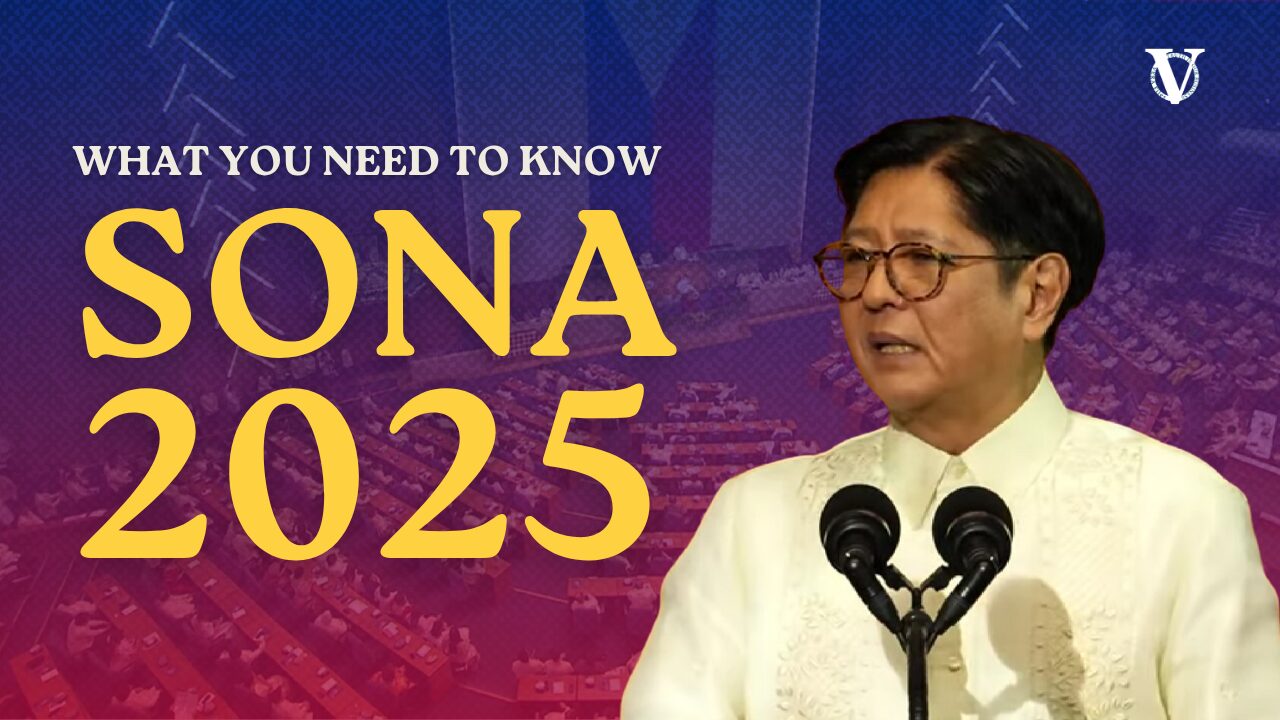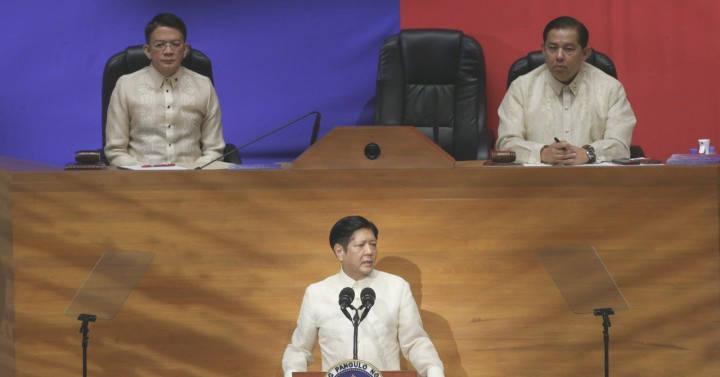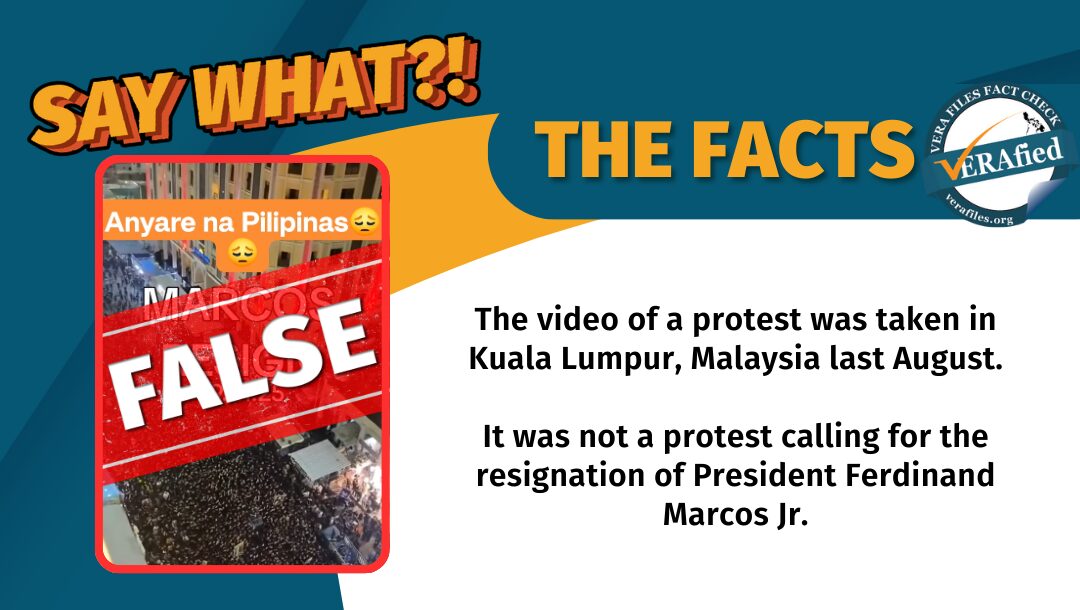
President Ferdinand Marcos Jr. lashed out at corruption in the government’s infrastructure program, specifically the flood control projects, and vowed to go after the culprits, earning him a standing ovation and thundering applause in his fourth State of the Nation Address on Monday.
“Alam naman ng buong madla na nagkaka-racket sa mga proyekto. Mga kickback, mga initiative, errata, SOP, for the boys. Kaya sa mga nakikipagsabwatan upang kunin ang pondo ng bayan at nakawin ang kinabukasan ng ating mga mamamayan. Mahiya naman kayo sa inyong kapwa Pilipino! Mahiya naman kayo sa mga kabahayan nating naanod o nalubog sa mga pagbaha! Mahiya naman kayo lalo sa mga anak natin na magmamana sa mga utang na ginawa ninyo, na binulsa niyo lang ang pera,” he declared.
Marcos ordered the Department of Public Works and Highways to submit a list of all flood control projects in the country over the last three years which would be scrutinized to find out which ones are ghost projects, have failed, or remain unfinished. He encouraged those who know about these anomalous projects to check the list which would be published.
“Sa mga susunod na buwan, makakasuhan ang lahat ng mga lalabas na may sala mula sa imbestigasyon. Pati na ang mga kasabwat na kontratista sa buong bansa. Kailangan malaman ng taong-bayan ang buong katotohanan. Kailangang may managot sa naging matinding pinsala at katiwalian,” the president promised as the audience shouted “BBM! BBM! BBM!”
He wasn’t done.
Marcos warned that he will reject any proposed national budget for 2026 that is not aligned with the government’s expenditure program – even if it means resorting to a reenacted budget.
On the issue of the missing sabungeros, he said the government will go after the masterminds, no matter how powerful, connected or wealthy they are, adding that they will not be above the law.
Halfway through his six-year term that ends in 2028, the president assured that he got the message from the disappointing results of the mid-term elections for his administration and vowed to do everything he can to improve government services in the next three years.
“Bigo at dismayado ang mga tao sa pamahalaan, lalo na sa mga pangunahing serbisyo. Ang leksyon ay simple: kailangan pa nating mas galingan. Kailangan pa nating mas lalong bilisan din ang trabaho,” he admitted.
Delivered almost entirely in Filipino, Marcos avoided mention of politics and appealed for unity.
“Isantabi na natin ang ating pagkakaiba, at magkasundo na sa tatlong bagay na nagbibigkis sa atin: sa ating pagiging Pilipino, ang ating pagiging makabansa, at ang ating sinumpaang tungkulin sa taumbayan,” the president said.
For most of his one-hour-and-10-minute speech before the joint session of the 20th Congress, he laid out his plans for the various sectors: agriculture (more Kadiwa stores selling P20 per kilo rice nationwide, plant one million coconut trees, improve irrigation, subsidies and other benefits for farmers), increased health benefits through PhilHealth and improved medical services for children, complete electrification for areas that lack power, improve water and transportation (discounts for students and families on MRT/LRT, return of Love Bus for free) services, implement infrastructure projects, specifically roads and bridges, education (more school buildings, medical aid and more benefits for teachers, laptops for students), free WiFi, and improved disaster response.
Here are the highlights of the president’s SONA:
On agriculture
Marcos announced that P113 billion has been earmarked to further expand the government’s Kadiwa program where consumers nationwide are able to purchase rice at P20/kilo. Not only has this aspiration been achieved, it was done with farmers not being left at a disadvantage.
“Napatunayan natin na kaya natin ang P20 na bigas na hindi malulugi ang mga magsasaka,” he declared. (We have proven that P20/kilo of rice is possible even as farmers will not be at a loss.)
At the same time, the president gave notice to unscrupulous traders who would manipulate prices of palay and rice or take advantage of farmers. “Hahabulin namin kayo, dahil ang trato namin sa inyong ginagawa ay itinuturing naming economic sabotage.”
The government made moves to reduce prices of commodities, including pork, corn, onions and garlic through increased production, construction of farm-to-market roads, irrigation, and other post-harvest facilities. The administration is aiming to further enhance other industries like salt and coconut. He announced the goal of planting 100 million coconut trees nationwide to push exports and called on Congress to amend the Coconut Farmers and Industry Trust Fund Act to make it more responsive to farmers’ needs.
Since Marcos took office in 2022, over 8.5 million farmers and fisherfolk have received government aid and the Department of Agrarian Reform has been fast-tracking the distribution of the Certificate of Land Ownership and e-Titles, which should ultimately free agrarian reform beneficiaries from debts.
Marcos said they will invest in the development of agricultural technology, through the Department of Science and Technology, and offer agricultural scholarships, courses and programs will be offered to children of farmers and fisherfolks to preserve their parents’ noble livelihood.
On energy
Marcos promised to unburden Filipino households of poor and costly utility services – both for electricity and water supply. Without naming names, the president said he will probe these companies and even direct them to refund consumers, if needed, to avoid a ripple effect in other service areas.
The Marcos administration seeks to connect five million more Filipino households to power grids, having connected 2.5 million households since Marcos became president. However, to achieve Marcos’ 100% electrification promise, the country would need at most P100 billion, according to former energy secretary Raphael Lotilla.
As he called out erring energy concessionaires and ventures, Marcos singled out the blackouts in Siquijor, which has plunged the province into a state of calamity. Siquijor’s power grid solely runs through the Siquijor Island Power Corp., a Villar-owned venture, like the controversial PrimeWater Infrastructure Corp.
On the environment
“Mahiya naman kayo,” Marcos exclaimed, as he called out government contractors benefiting from kickback from substandard infrastructure projects. For this reason, the president said he will publicize an approved list of public-funded flood control projects, which drew flak in 2024 as Filipinos suffered typhoons supercharged by climate change.
The president again justified vetoing over P16 billion in flood control project funds for the 2025 national budget, explaining he will continue to axe flood control projects that do not align with his administration’s direction. This, despite boasting 5,500 finished flood control projects and 5,500 more in the pipeline in his 2024 SONA.
He recognized the catastrophes frequently faced by Filipinos and emphasized the efforts to adapt to the new normal of tropical cyclones and climate change, “Masigasig din ang ating paghahanda at pagmamatyag laban sa banta ng sakuna at kalamidad, lalo na sa bagong normal at nagbabagong klima na nagbubugso na panahon.”
Marcos pledged to build more dedicated and modern evacuation centers, aiming to put an end to the use of schools as evacuation shelters. He also noted the continuous operation of advanced predictive technologies like Doppler radars, Broadband Seismic Stations, PAGASA’s landslide sensor system, and PHIVOLCS’s presence across regions.
On the economy
“Kung datos lang ang paguusapan, maganda ang ating ekonomiya, tumaas ang kumpyansa ng mga negosyante, bumaba ang inflation, dumami ang trabaho. Ngunit ang lahat ng ito ay palamuti lang at walang saysay kung ang ating kababayan naman ay hirap pa rin at nabibigatan sa kanilang buhay.”
Marcos admitted that the administration’s economic achievements are useless if they are not felt at the grassroots. Among those he highlighted was the country’s inflation rate, which declined to 3.2% in 2024 from 6.0% the previous year. The country’s headline inflation in June 2025, however, increased to 1.4% from 1.3% in the previous month.
The chief executive urged concerned agencies to find livelihood for unemployed Filipinos, provide capital for microenterprises with lower interest and no collateral and give capital and protection for intellectual properties. He also promised to continue providing free training and capital to 2.5 million poor Filipinos and improve industries such as manufacturing, electronics, biotechnology, pharmaceuticals, Filipino fabrics and Halal.
Besides data, he glossed over several developments in the country’s economy, including the 1% tariff reduction following his visit to the United States. He made no mention of the controversial Maharlika Investment Fund and priority legislative acts in the economy like the Budget Modernization Act, Revised Government Auditing Act, Excise Tax on Single-Use Plastics, and Motor Vehicle User’s Charge Tax.
On infrastructure
From promises of going “full speed ahead” in his previous SONAs, Marcos now seems to justify the significant delays in his administration’s infrastructure drive by saying that it is “not building only for today” but “building also for tomorrow.”
Marcos highlighted the administration’s accomplishments, namely the completion of the Nalil-Sikkiat Bridge in Mindanao, the rollout of the Dalian trains that were left unused for a decade, the completion of the first three phases of the National Fiber Backbone Project, the launching and operations of the E-Gov app and the establishment of almost 19,000 Free Wi-Fi sites in the country. He also mentioned railway, bridge and road projects such as the North-South Commuter Railway Project, Malassa Lupa Pula Bridge, Bataan-Cavite Interlink Bridge and Mindanao Transport Connectivity Improvement Project.
Despite the backlogs, Marcos made new promises, such as the revival of the “Love Bus” as well as providing all public schools with internet connections by the end of the year. He also urged concerned agencies to prioritize the rehabilitation and maintenance of hanging bridges and the efficient registration and release of license plates. Marcos also condemned corruption in the management, construction and delay in some projects as well as neglect in their maintenance — citing the Cabagan-Sta. Maria bridge collapse and the San Juanico bridge crisis. However, he notably skipped the right-of-way and funding issues hounding several of his big-ticket projects.
On social services
Alongside various outpatient and rehabilitative services now covered by PhilHealth, Marcos boasted that zero balance billing is now being implemented in Department of Health hospitals – meaning, Filipinos will no longer pay out-of-pocket for their hospital bills. However, the unmentioned controversial transfer of P89.9 billion PhilHealth’s idle funds to the national treasury looms, which is awaiting decision from the Supreme Court.
The Pantawid Pamilyang Pilipino Program was also at the forefront of the president’s address. Over five million 4Ps households received conditional cash grants since the start of his term. More than 1.5 million families also became self-sufficient and graduated from the program. On top of promising 4Ps amendments, Marcos said children, specifically their college education, will be given top priority in his remaining three years as president.
Further, the administration’s Walang Gutom Program has helped over 600,000 households. Marcos aims to reach 750,000 households by 2027. Government agencies are also working hand-in-hand to implement feeding programs in daycare centers and public schools, benefiting over 3.5 million students. Marcos added an additional P1 billion fund to further enhance the program.
On foreign relations
Marcos boasted that the Philippines is now highly respected in the global arena because he has been dealing with other countries properly, fairly and calmly and that the country complies with agreements and the laws and regulations of the international community.
Amidst the continuing threats to the country’s sovereignty and peace, the president said the administration’s preparations, surveillance and defense are now more intense.
“However, we are still holding back and remaining patient, especially in looking after our entire archipelago and protecting our interests, but now our confidence is even higher because we now have more allies who will be our shoulder to shoulder in times of great need.”
He said his administration’s foreign policy remains the same. “The Philippines is a friend to all. The Philippines is an enemy to none. That will be our main focus as we, the Philippines, host the ASEAN summit in 2026.”
Marcos also expressed deep gratitude to the countries that have granted clemency to more than 600 overseas Filipino workers who had been sentenced for various legal infractions. He particularly mentioned the sultanate of Oman, United Arab Emirates, Qatar and Bahrain.
On education
Child welfare took the spotlight in Marcos’ education promises. The president boasted of addressing the backlog of daycare centers that has built up since 1990 and allocating P1 billion towards building 300 barangay child development centers in remote areas. He also promised to increase the number of guidance counselors in schools. “Binabantayan natin ang mental health ng ating kabataan (We are safeguarding the mental health of our youth),” he said.
After fulfilling last year’s promise of providing educators with a teaching supplies allowance, Marcos declared that teachers shall also begin receiving overtime and teaching overload pay for this school year, on top of enjoying other newly-added benefits like laptops, reduced documentary requirements and free medical check-ups and laboratory tests.
Amid the pilot implementation of a revised senior high school curriculum beginning this school year simplifying the program into two tracks — academic and technical-vocational — Marcos reported improved quality of education and an increase in scholars under the Technical Education Skills and Development Authority. TESDA data shows that learners who successfully completed and received certification under senior high school programs grew nearly four times from 4,478 in 2023 to 16,267 in 2024.
On labor, OFWs
Among the first commitments that Marcos made in his fourth SONA was to renew his promise to find jobs for 4% or over 2 million unemployed persons within his last three years in office.
Marcos first pledged to eliminate joblessness in his 2023 SONA. At that time, the Philippine Statistics Authority recorded 4.3% or 2.11 million unemployed individuals in May 2023. Two years later, the rate has only dropped to 3.9% or around 2.03 million persons in May as government efforts remain sluggish.
While Marcos did not make any new promises for migrant workers, he touted the eGovPH app for streamlining the processing of their documents. Using the mobile application, overseas Filipino workers can now apply for their digital OFW passes, process their immigration and customs papers, and create their own biodata.
“Sa pinagsama-samang serbisyo sa isang mobile app, ang pamahalaan ay talagang mas malapit na at nasa inyo ng mga kamay,” Marcos added.
The president also thanked the Sultanate of Oman for helping secure the release of 17 Filipino seafarers taken hostage by Houthi rebels in 2023.
On good governance
With alleged billions worth of legislative discretionary funds and budget insertions hounding the 2025 spending plan, Marcos warned Congress that he would not sign the 2026 budget if it is inconsistent with the administration’s programs.
“I am willing to do this even if we end up with a reenacted budget,” Marcos remarked just before he ended his address.
A reenacted budget happens when Congress fails to pass a General Appropriations Bill before the year ends, forcing the government to operate using previous year’s budget until a new one is enacted.
A petition currently pending before the Supreme Court seeks to declare unconstitutional the P26.16-billion funding for the Ayuda para sa Kapos ang Kita Program in the 2025 budget, which critics view as “effectively constitut[ing] pork barrel.” The pork barrel is a congressional discretionary fund declared illegal by the High Court in 2013.
Reports also allege that Senate President Chiz Escudero has inserted over P142.71 billion in the 2025 budget during a closed-door session of select Senate and House members. The amount allocated for flood control and infrastructure projects reportedly lacked engineering details and geographic references, and were split into several contract packages.
Marcos previously vetoed P194 billion worth of line items in the 2025 budget, P168 billion of which was unprogrammed funds while P26 billion was from projects under the DPWH.
On the Armed Forces
Marcos skipped mentioning issues related to the Armed Forces in this year’s SONA.
Two bills he asked Congress to pass in 2022 have not been legislated: a bill for a unified pension system for the military and other uniformed personnel and the revival of a mandatory Reserved Officer’s Training Corps.
On the peace agenda
Marcos announced no remaining guerilla groups in the country and that the government will ensure none will be formed again. This, despite a reported encounter just a day before the SONA where seven alleged members of the New People’s Army were killed by the 2nd Infantry Battalion in Masbate.
The president boasted about livelihood programs for former rebels in the form of classrooms, roads, health stations, water access and career assistance. He also thanked ex-combatants who now run the Bangsamoro Autonomous Region in Muslim Mindanao for maintaining peace and order in the region.
On drugs and crime
The president said the government will pursue the masterminds and others involved, be they civilians or officials, behind the disappearance of the missing sabungeros. “Kahit malakas, mabigat o mayaman, hindi sila mangingibabaw sa batas. Higit sa lahat, ipararamdam natin sa mga salarin ang bigat ng parusa sa karumal-dumal na krimen ng mga ito (No matter how well connected, powerful or wealthy they are, they will not be above the law. Above all, we will make the perpetrators feel the weight of the punishment for their heinous crimes),” he said, eliciting applause and cheers from the audience.
He said that even if crime statistics show a decline, nothing can assuage the fear and anxiety of the public, particularly crime victims but the quick response of authorities. He assured of the law enforcers’ five-minute response time to calls for help.
On the drug war, he said his administration has already confiscated P83 billion worth of illegal drugs, arrested over 153,000 suspects including 9,600 high-value targets. He lamented, however, that 677 of them were government employees, more than 100 were elected officials and 50 were police officers.
The chief executive bragged that his administration is already close to achieving in its first three years what the previous administration did in six years. He said the operation against drug dealers, big or small, will continue.
– With reports from Tita Valderama, Elma Sandoval, Blanch Ancla, Bryan Manalang, Valerie Nuval, Mon Caling, Kiara Gorrospe, Elle Manlangit, Ana Mikaela Carlos, Avon Claire Tabla





